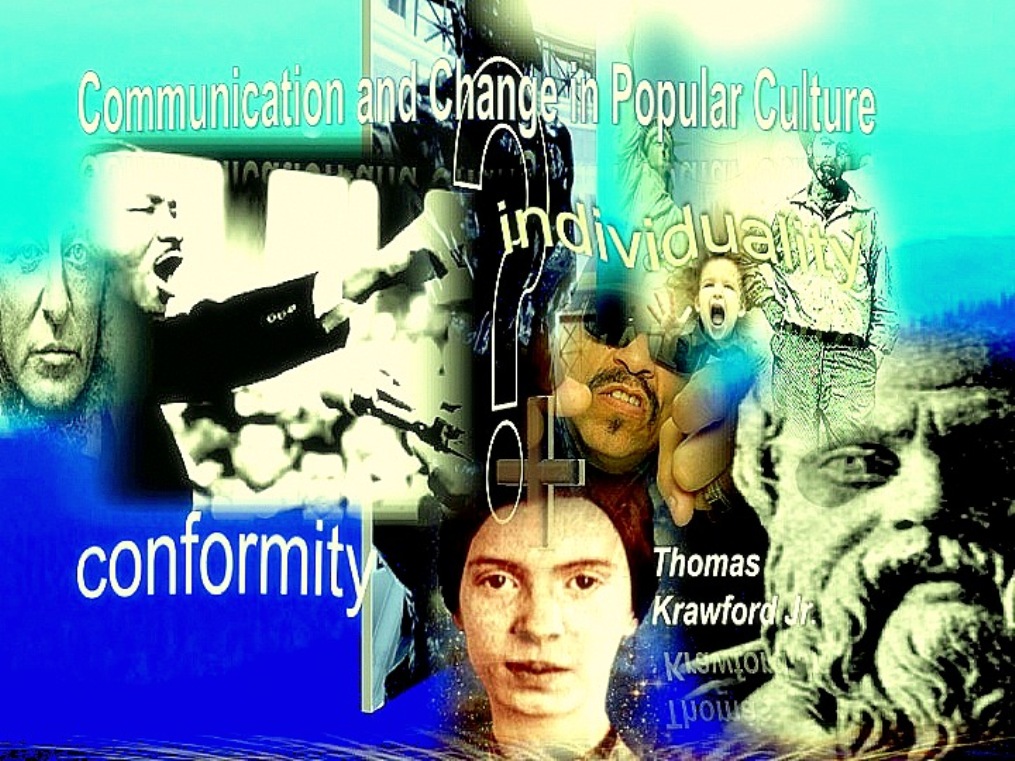I am almost 85% positive that the above link will function properly. Since 85% are pretty good odds, I am going to proceed as if everything is o.k. Unfortunately this will be my last post for a while: the bills are piling up, so I will make this one, for all intents and purposes, speak for itself. In addition, I am going to further establish a context of application by briefly touching on some of the current thought in the field of Speech Communication in particular and Humanities in general. I say in general based on what will be a survey of Harold Blumer's Symbolic Interaction Theory, Affect Control Theory and Postrado's Interrelation Theory.

Here we are suggesting that 2) Speech Communication to get something is like mixing colors of material.
This particular example brings us closer to Harold Blumer's Theory of Symbolic Interactionism. Especially if we take into account his argument that meaning, language and thought are the core principles of integration into the resulting individual personality in direct, joint and inverse relation to the community the individual most closely identifies with.
Our argument seeks to extend Blum's assertion by claiming that core personality formation in terms of what is the original source of groundedness starts with dual elements of condition: inherent capacity and probable quantity which both environment and instinct construct as the result of what we seek to know (discrete cognition) and what we wish to possess (continuous cognition)
 In a system of thought and behavior that is at once discrete and continuous, I am not contradicting B.F. Skinner's Theories regarding the role the environment plays in what Blum argues is the process of socialization. Rather, I assert that the cognitive map configuration O'Keefe argues for, exists as the joint, direct and inverse result of a hierarchical, yet binary integration of that which is known as a counter interaction to that which is not. That which can never be known in the underlying, individual sense in this case must be that which is error: an inherent dual capacity of first origin which exists as known and unknown common inherent quantity.
In a system of thought and behavior that is at once discrete and continuous, I am not contradicting B.F. Skinner's Theories regarding the role the environment plays in what Blum argues is the process of socialization. Rather, I assert that the cognitive map configuration O'Keefe argues for, exists as the joint, direct and inverse result of a hierarchical, yet binary integration of that which is known as a counter interaction to that which is not. That which can never be known in the underlying, individual sense in this case must be that which is error: an inherent dual capacity of first origin which exists as known and unknown common inherent quantity.Equal Original Root Capacity
On its face, then what I argue may in fact lend some credibility to theorists such as Edward C. Tolman. But I would go further. I assert the theory I propose is an effective bridge of Tolman's Cognitive Map Theory with Hull's Drive Theory. Clark Leonard Hull's theories of Drive and Drive Reduction presuppose a causal relationship between inherent capacity which I ague is necessary and discrete and object desire, which I again assert is probable and thus continuous. Yet, the physiological needs organisms are born with in terms of inherent quantity are probable and cannot exist without first being the result of an original integration of known and unknown capacity which is the result of a discrete counter causal integration.
In other words all thought and behavior is first the response of that which is discrete capacity in joint, direct and inverse relation to that which is continuous quantity.
Tolman's Theories describe only the joint relationship between inherent nature and environment, while Skinner's Theories primarily focus on the direct possibility of inherent and equal capacity of nature integrated in the context of environmental stimulus. Clark's Theories on the other hand, presuppose an inverse causal relationship between inherent human nature and external stimulus.
What I propose is that there is a Constant Original Root Capacity upon which the probable quantities of Object meaning, language and thought are constructed in a range from what is known and reinforceable to that which is unknown and yet shapes activation of goal-oriented behavior.
Adapatability
The above link will help in this next discussion.
Yes, I do agree with the assertion that individuals shape and execute their thoughts into patterns of behavior that directly and jointly correspond to immediate situational context (s). Yet, I hasten to add, this contention does not necessarily account for the facility of interpretation.
Nevertheless, I also agree that individuals whose expressed range of feeling response (s) are of themselves altered by the individual according to the range of contextual demands the individual integrates as necessary correlates of parameter self assessed through the interpretive process. However, I argue that the interpretive process doesn't, unfortunately, presuppose, an inherent object of Emotional Signal relative to the elements of condition between experiences and definitions of situations. Rather, because of the inherent nature of the interpretive process, emotional signals cannot exist without there first being the inherent root capacity for such correlation.
I other words, from a purely Speech Communications perspective, I argue that emotional signaling is only a range of probable quantity: whereas the necessity of emotional capacity remains that upon which emotional signaling originally depends.
http://www.interrelation-theory.com/aboutme.html
In Postrado's Theory, the argument evolves from the concept of a Common Interrelated Originator. But, what are we to say about the capacity and quantity of this being should he or she exist. At best what we have ultimately is probability. For instance, what if we were say that this Prime Originator was pure energy.
What do we know for certain about energy?
We know that Energy cannot be created or destroyed: simply transformed.
Pure Energy is purely adaptable. In Albert Einstein, we know that this adaptability is implied because, according to the General Theory of Relativity, Energy equals mass times the speed of light squared.
But what if Energy also equaled mass divided by the Quantity of Gravity cubed in inverse relation to the speed of light squared. And what if Energy also equaled the Joint summation of the Capacity quantity Pi over pi times the cubed root quantity of the speed of light squared.
The fact remains, in terms of our general focus in this issue of either Prime Originator or relative time and space, we can no more claim a single point as the "Originator" as we can say for certain that Energy only equals mass times the speed of light squared.
Our purpose then, according to the theory I propose, is to not rely solely on what any of us considers established fact as a source of change.
...But rather devote our individual and collective energies in joint, direct and inverse integration of inherent capacity and probable quantity in pursuit of the "question"
We are the result of those who came before us and the beginning of those still to come.
No one answer is ever enough.


+of+IMG_9264.jpg)














No comments:
Post a Comment